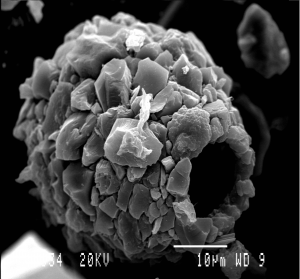In their research from the Polish Carpathians, dr hab. Katarzyna Marcisz and prof. UAM dr hab. Piotr Kołaczek from Climate Change Ecology Research Unit AMU analyze testate amoeba communities present in disturbed peatlands. The research was published in The Holocene: Marcisz, K., Buczek, K., Gałka, M., Margielewski, W., Mulot, M., Kołaczek, P., 2021. Past testate amoeba communities in landslide mountain fens (Polish Carpathians): The relationship between shell types and sediment. The Holocene 31, 954-965.
Researchers from the AMU studied the history of disturbed peatlands in the Polish Carpathians, paying special attention to the hydrology of these sites. Many peatlands in the Carpathians are located in landslide niches, and their development is influenced by a number of processes, such as increased surface runoff or landslides after heavy rains. Under such hydrologically unstable conditions, testate amoebae - single-celled microorganisms commonly found in peatlands - have a very difficult time functioning. They have to face not only large fluctuations in water levels, but also the supply of mineral matter to the bog. The study was able to show that the testate amoeba communities found in such peatlands are strongly dependent on the presence of mineral matter. During periods of increased supply of mineral matter to the peat bog, the testate amoeba communities were dominated by those that use mineral matter to build their shells. This information is useful for interpreting the results of studies of the development history of peatlands, especially of highly disturbed sites.
Research was done together with researchers from the Polish Academy of Sciences, University of Lodz and University of Neuchâtel (Switzerland). Scientific work financed from the budget sources for science activity in 2016–2019, project number 0342/IP1/2016/74.
The photo shows the shell of testate amoeba of the genus Difflugia, which uses a variety of mineral material available in the environment to build its shell (photo by Prof. Mariusz Lamentowicz).
